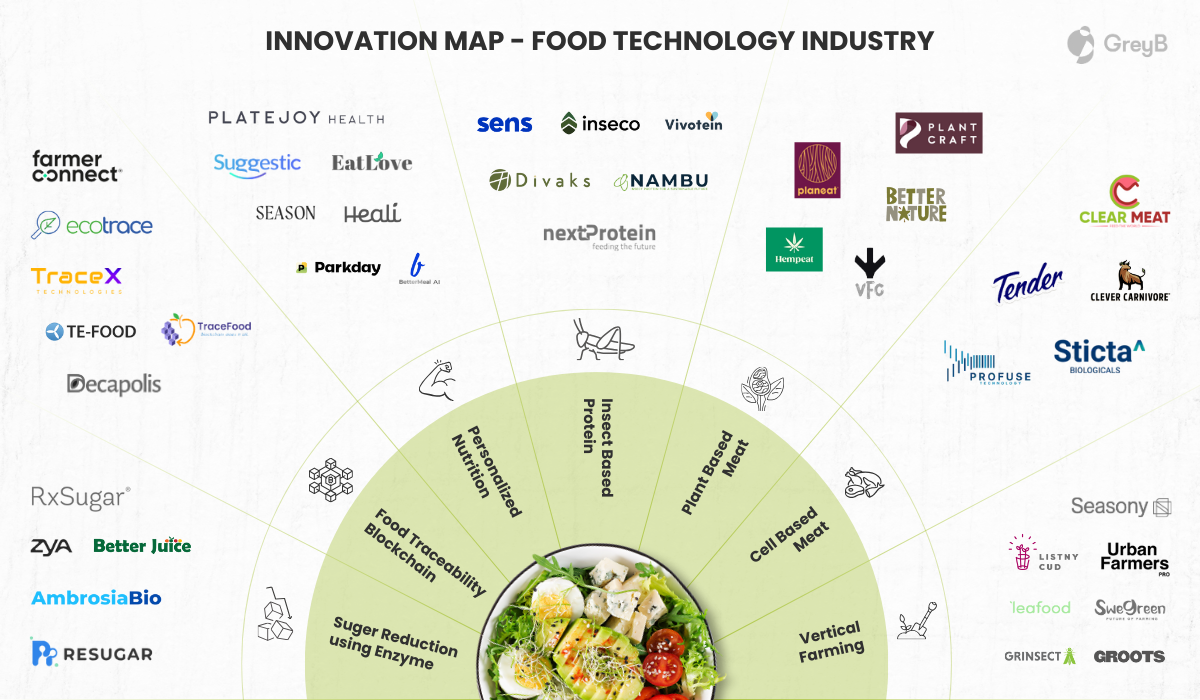As the demand for cleaner and eco-friendly food increases, the food industry faces a significant challenge in meeting the growing global demand for protein. Traditional protein sources, such as meat and dairy, are resource-intensive, requiring large amounts of water, land, and feed to produce. Additionally, these traditional protein sources contribute significantly to greenhouse gas emissions.
Insect-based proteins present a promising solution to these challenges. Insects are protein-rich and require significantly fewer farm resources than traditional livestock. They can be reared on organic waste, turning a waste management problem into a protein production solution.
Furthermore, insects emit fewer greenhouse gases and less ammonia than cattle or pigs. Insect farming also has a lower risk of zoonotic diseases than traditional livestock farming. The production of insect-based protein is also scalable and can be done in controlled environments, leading to consistent and predictable yields.

Explore the recent innovations in food technology! Learn about leading startups creating plant-based and cell-based meat alternatives and more. Get your hands on our Food Tech Startup Report to uncover the latest trends shaping the future of food.
Fill out the form below and request your copy today!
This article explores five growth-stage startups in the food sector working on solving critical challenges with alternative protein. These startups have the potential to grow rapidly, are in a good market position, or can introduce game-changing technology in the next 2-3 years. This makes them a great option to partner with, collaborate with, or acquire.
1. SENS Foods
| Founding Year | 2016 |
| Headquarters | Berlin, Germany |
| Total Funding Amount | €1.9M |
| Last Funding Round/Amount | Seed round/€1.9M |
| Website | eatsens.com |
| Innovative Tech | Makes food products from cricket flour |
SENS Foods is an innovative food startup that makes food products from cricket flour, which is a more efficient and sustainable source of protein compared to traditional ones. This addresses the challenge of finding sustainable and affordable high-quality protein sources, a significant issue in the food industry.
Their products contain 70% protein, the same quality as high-end beef. Since these do not require livestock, there’s no need for antibiotic treatments. Furthermore, this protein uses 2000x less water, 15x less land, and 100x less greenhouse gases than livestock-based ones.
The startup generates very little waste and uses nearly all cricket byproducts. Even the exoskeleton and fecal matter are repurposed as potent fertilizers.
The CEO, Radek Husek, has a decade of entrepreneurial experience in cricket farming. In 2021, he was listed among Forbes’ 30 Under 30.
SENS Foods raised €1.9M in seed funding on November 14, 2019.
2. Inseco
| Founding Year | 2017 |
| Headquarters | Europe, Middle East, and Africa |
| Total Funding Amount | $5.3M |
| Last Funding Round/Amount | Seed round, $5.3M |
| Website | inseco.co.za |
| Innovative Tech | Uses insects to convert waste food into proteins |
Traditional solutions such as composting and landfilling have environmental impacts. Inseco uses insects to convert waste food and other organic by-products into proteins, oils, and fertilizer to solve that.
The startup has found a way to use black soldier flies to upcycle low-value organic material into high-value insect products. This approach addresses the waste management problem and produces sustainable and nutritious products for animal feed, pet food, crop production, cosmetics, and pharmaceuticals.

The EntoPod, their on-site organic waste management system, allows waste to be managed closer to its source, removing the requirement for waste transportation. They work alongside waste generators in the public and private sectors, helping them upcycle their organic by-products.
Their CEO, Simon Hazell, has led the company for six years. He earned an Honours Degree in Economics from the University of Cape Town.
In 2019, Inseco was awarded first place and crowned the global winner of the Global Cleantech Innovation Program (GCIP) competition.
They’ve raised $5.3M in funding in a Seed round on Apr 27, 2022.
Intrigued by these innovative insect-based protein startups?
Subscribe for insights into more such startups solving core industry challenges.
3. Divaks
| Founding Year | 2020 |
| Headquarters | Vilnius, Lithuania |
| Total Funding Amount | €4.5M |
| Last Funding Round/Amount | Seed round/€1.5M |
| Website | www.divaks.com |
| Innovative Tech | Uses the yellow mealworms for protein |
Divaks is a food-tech startup that develops insect protein solutions for the food industry. They use the yellow mealworm (Tenebrio molitor) as a source of protein. Their insects are bred and reared using unique diets to influence the nutritional values of the final products.

They are working on establishing an industrial-scale yellow mealworm plant in collaboration with the Buhler Group. This focus on a specific insect and the development of a vertically integrated business model allows them to provide high-quality, sustainable, and traceable insect protein products.
Divaks has signed a Novel Food licensing agreement with Protix, an insect industry pioneer. This license covers frozen or dried yellow mealworms and dried yellow mealworm powder.
The CEO, Kęstutis Lipnickas, is a BMI Executive Institute graduate with over a decade of startup management experience.
Divaks has raised €4.5M in funding. In Feb 2023, they raised seed funding of €1.5M.
4. Nambu Group
| Founding Year | 2018 |
| Headquarters | Grahamstown, South Africa |
| Total Funding Amount | ZAR2.5M ($133.4K) |
| Last Funding Round/Amount | Seed round |
| Website | nambugroup.co.za |
| Innovative Tech | Uses food waste into nutritious pet feed |
Nambu Group is an insect protein company that turns food waste into nutritious, environmentally friendly livestock, fish, and pet feed. This addresses the pressing issue of food waste disposal at landfills and provides innovative solutions for recycling beyond composting. It helps meet the growing demand for protein and the scarcity of traditional protein sources, such as soy and fishmeal.

They feed organic food waste to the larvae of the Black Soldier Fly, which then reproduce. Nambu Group uses this to produce a high-value protein feed for poultry, pork, fish farming, and exotic pets.
They provide breeding stock, cages, live larvae, and other supplies to enable people to start their own operations.
The CEO, Lowell Scarr, is a Rhodes University graduate with over a decade of agricultural research experience.
Nambu Group has raised a total of ZAR2.5M in funding, the latest of which was raised on December 1, 2022.
Explore trends that will impact the food tech industry in 2024. Get access to the Food Tech Trends 2024 report from here –
5. nextProtein
| Founding Year | 2015 |
| Headquarters | Paris, France |
| Total Funding Amount | €11.6M |
| Last Funding Round/Amount | Series A/€10.2M |
| Website | nextprotein.co |
| Innovative Tech | Its bioconversion process produces feedstock protein using the Black Soldier Fly |
nextProtein helps tackle land and resource scarcity using insect protein as feedstock.
Their innovative bioconversion process produces feedstock protein using the Black Soldier Fly. This fly species is selected especially for its beneficial, high-yield quality, as it can be processed into a powder, oil, and fertilizer. Their processes use less land, water, and energy resources, with less greenhouse gas emissions, than traditional agriculture.

nextProtein is approved by the EU for aquaculture feed and can be used for feedstocks for the poultry and pork industries and pet food. They are increasing our production capacity to one tonne of protein per day.
The startup makes three products – nextProtein, nextOil, and nextGrow.
nextProtein is a dry protein powder used as a feed ingredient for aquaculture, pet food, and other animal feed. nextOil is a lipid product that can be used as a feed ingredient for aquaculture and other animal feed. nextGrow is a natural fertilizer made from Black Soldier Fly excreta and their organic waste for use in agriculture.
Their CEO, Mohamed Gastli, is an eco-entrepreneur with nearly two decades of experience in the field. He has a degree in chemical physics engineering from HEC Paris.
nextProtein has raised €11.6M in funding. In May 2020, they raised €10.2M in Series A funding.
Partner with these cutting-edge startups to tackle your industry’s toughest challenges and stay competitive.
Learn how GreyB discovers similar ventures that perfectly fit your needs.
Authored by – Hemanth Shenoy, Market Research
Next Read: Alternative Protein Startups












